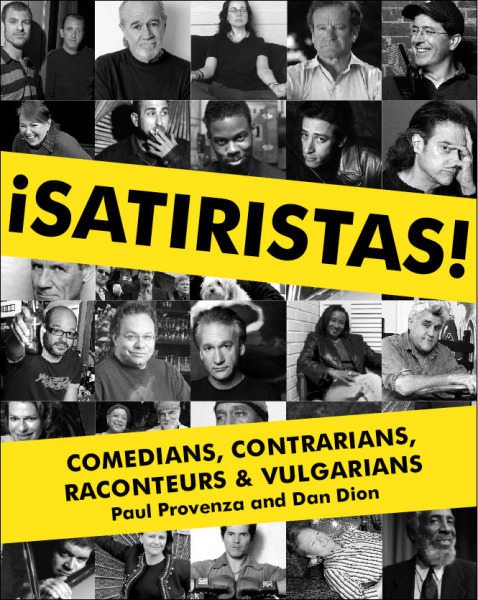In photographer Dan Dion’s portrait of comedian, satirist, playwright and Daily Show essayist Lewis Black, the subject — in his sweater and glasses, seated comfortably at what looks like a hotel bar — appears at first glance to be a picture of the artist in late middle-age.
The shot could easily be an author jacket photo, except for two details: first is the cloud over his chest. What initially seems like a trail of cigarette smoke above Black’s hand and forearm (which are resting casually on the chair-back) quickly comes into focus as that same hand and forearm extended into a middle finger, a fuck-you salute captured in a split second of exposure before the hand dropped for the photograph. The second detail is Black’s smirk — a face that seems to be simultaneously hoping you saw the bird he flipped as well as wondering if he got away with it.
The portrait captures the same tension as the accompanying interview by fellow stand-up Paul Provenza: Black is intelligent and sophisticated enough to participate in any political or philosophical conversation going; but he’s a smart-ass above all else, and the particular filter on his genius means that however wise, however enraged, whatever he has to say is also going to make you laugh.
It’s a similar story throughout most of Satiristas, Dion and Provenza’s celebration of politically-minded comedians (or, as they’re dubbed here, “contrarians,” “comic subversives,” “raconteurs” and “vulgarians”). On the whole, Satiristas is a wildly compelling, penetrating document of people brilliant enough to deconstruct our society, but wise-ass enough not to be able to read the word “penetrating” without at least smiling (at one point, in an introduction touching on Che Guevara, George Orwell and America’s Founding Fathers, Provenza pauses to contemplate his use of the word “blew.”)
I got to work with Dan Dion this past fall, on a TV special featuring stand-up comics from around the English-speaking world. I was employed as a writer on the show, but Dion’s role was something more unique: interspersed with footage of onstage performances and backstage conversations were scenes of Dion taking pictures of the featured comics (in this case: Jon Dore, Maria Bamford, James Smith, Matt Kirshen and Mae Martin).
For the more experienced comics, like Bamford, it wasn’t the first time in front of Dion’s camera — but for others, the photo sessions were a sort of rite of passage, a chance to be shot by a photographer who’s made a specialty of comics’ portraits, and who has captured some of the greats: Lily Tomlin, Stephen Colbert, Dick Gregory, Robert Klein, Patton Oswalt, George Carlin, Paul Mooney, Robin Williams, Roseanne Barr, The Smothers Brothers and countless others.
Those particular legends are more than just funny; each of them has also combined their work in comedy with thoroughgoing, engaged social and political critique. Dion captures them so well because his approach is antithetical to the gimmicky, forced “wackiness” usually employed in photos of comedians, “which is especially annoying to comics who view themselves as social commentators rather than clowns.”
For his part, Provenza has emerged as comedy’s answer to the embedded journalist (albeit with much more illuminating results). Like the novelist who still does book reviews, Provenza has made a career of not only stand-up, but of encouraging — in projects such as The Aristocrats and The Green Room and, now, Satiristas — funny, insightful reflection by comedians on comedy. Here, with more than 60 interviews (each accompanied by one of Dion’s photos) Provenza has pulled off something Studs Terkel could have been proud of: a collection of oral histories that, taken together, illuminate the politics, working lives and biographies of some of America’s greatest contemporary satirists.
Provenza’s approach works because with few exceptions, conversations with comedians are almost always surprising in their depth. Unlike the actor or musician whose sophisticated performance may imply an intelligence that often evaporates at interview time, comedians almost always play the goof for the world, with furious intellectual work going on beneath the surface.
In recent decades, from Vietnam to Iraq and Afghanistan, Enron to Goldman Sachs, the violence, corruption and greed of governments and corporations has been largely passed over by complicit media and aloof cultural producers; one of the great exceptions has been the steady stream of sharp, funny people aiming their slingshots and firing.
Amidst the horror of America’s invasion of Vietnam, The Smothers Brothers reached millions of viewers with an anti-war message; in the post-Reagan, late-80s wasteland of sexist, anti-labour America, Roseanne offered a dignified, gender-egalitarian blue-collar family; Stephen Colbert and Jon Stewart subverted not only the neo-conservative war-mongers of the George W. Bush years, but their enabling friends in the media as well.
Satiristas offers an unprecedented insight into what makes these, and other, hilarious political sharpshooters tick.—Charles Demers



